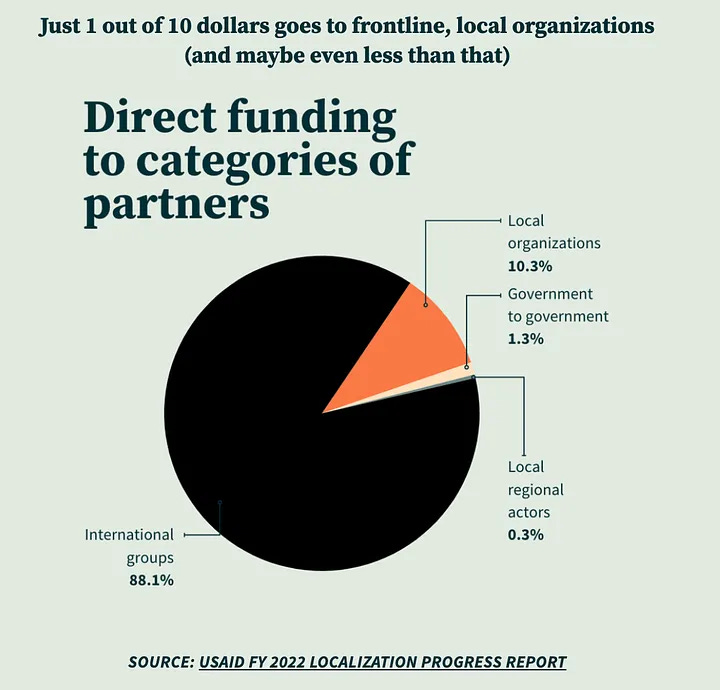We need your help to build a Glassdoor for Primes 🔎
The social innovation community needs an accountability platform for the aid industry to ensure promises made are promises kept.
Dear Unlock Aid community,
We're building an accountability platform for the aid industry — a "Glassdoor for Primes." We need your help to build it.
As this Follow the Money investigation shows, there’s not a lot “foreign” about foreign aid. Annually, Congress sets aside approximately $60 billion for U.S. international affairs spending, directing a substantial share of those investments for global development priorities like climate adaptation and preventing the next pandemic.
But the open secret in Washington, DC is that too little of that money ever leaves America’s capital city. According to a June 2023 report, nearly nine out of every ten dollars that USAID spent in the 2022 fiscal year went to its international “prime” contracting partners, most of which are based in or around the Washington, DC area.




Rather than pass this funding on to those local partners best positioned to do the work, the aid industry keeps most of the money for itself – sometimes as much as 82 cents of every dollar or more – leaving just pennies for the community-level organizations on the front lines.
Left unchecked, too many aid industry players also too often engage in business practices that break trust with local partners and cause long-lasting damage in the communities they’re paid to support. For example, in 2021, more than 73% of local organizations and smaller firms we surveyed told us that big contractors “always” or “often” used those organizations’ names to win big grants and contracts, only to later cut those same groups out of promised work, costing organizations’ significant sums in lost revenue.
The aid industry also too often:
Dictates how projects should work rather than taking direction from local leaders, perpetuating legacies of paternalism and colonialism.
Performs work in place of where legitimate local market participants could, distorting markets.
Pays their employees many multiples of local salaries, destabilizing local economies by creating brain drain, inflation, and artificial price bubbles.
Creates cutouts of themselves to win government grants and contracts that were targeted for truly local groups, engaging in legal but highly unethical business practices.
According to USAID’s own reports, "international partners undermine USAID’s localization agenda by registering themselves locally and citing local partners in proposals to which they ultimately do not allocate funds during implementation.” When USAID needs to make budget adjustments or cut funding from a project, contractors often cut funding from local organizations before taking a haircut themselves.
Approximately one year ago, we co-authored an open letter to USAID to ask the agency to bring more transparency to agency contracting as a way to put more sunlight on some of the the aid industry’s worst practices.
Unfortunately, these practices still persist.
That’s why, this summer, we plan to launch a new accountability platform that will function like a “Glassdoor for Primes.”
Here’s where you come in.
If you are unfamiliar with Glassdoor, it is a website that allows employees the opportunity to give public feedback on their employers.
The purpose of a similar platform adapted for global development will be to increase transparency and accountability for the largest aid industry players at the world’s largest development agencies. It should serve as a way for local organizations and social enterprises to navigate through the alphabet soup of large international NGOs and for-profit aid industry contractors to determine which bigger players keep their funding commitments, treat organizations with a spirit of true partnership, and involve local communities in decision making — and which ones don’t. Such a platform could also be extended to look at business practices of overseas USAID missions and other funders to identify those offices that are great to work with.
We’ll have a lot of design decisions to make. For example, should this be an open portal that anyone can access? Should it be more limited? What factors should be subject to evaluation?
We’ll need your help. If you want to get involved to help us answer some of the initial design questions, click here. Similarly, if you represent a big contractor, international NGO, or development agency, and you are trying to promote more inclusive development practices, please also let us know. We have ideas for you, too, on ways we can work together as we build this accountability tool.
Trust in our public institutions is waning. Since the 1950s, too many U.S. federal agencies have become beholden to a small cadre of expensive contractors and consulting companies to do their work. While a cottage industry makes billions of dollars every year, not enough public resources reach their intended recipients at the community level. This phenomenon widens inequities and causes harm.
To do the hard work of building a different future together we need a solid foundation based on trust.
Transparency does not pick winners or losers. It puts a spotlight on organizations that engage in the best practices, just as it serves as an important accountability tool for those that do not.
Get involved and help us build the relationships that allow for thriving partnerships for generations to come.
To Progress,
Unlock Aid




This is a great initiative! We are built something similar but for funders focused on Africa. We also have some Primes ratings though that isn't the focus on the platform. See more at sunlight.capital and leave a review!